'The MESSENGER

June, 1924



June, 1924

i INCLUDES I
f 1. Richmond College, a College of Liberal Arts for Men. J i 2. Westhampton College, a College of Liberal Arts for ! 1 Women. !
1 3. The T. C. Williams School of Law, a Professional ! I School of Law, offering the Degree of LL. B. I
4. The Summer School. W. L. Prince, M. A., Director. f
W.
L. PRINCE, M. A., DEAN
Richmond College for Men is an old and well-endowed College of Liberal Arts, which is recognized everywhere as a Standard American College. Its degrees are accepted at face value in the great graduate and technical schools of America. Its alumni are so widely scattered through the nation that the new graduate immediately joins a large and friendly group of men holding positions of power and influence. The College occupies modern and well-equipped buildings, on a beautiful campus of 150 acres in the western suburbs of Richmond.
MAY LANSFIELD KELLER, PH. D., DEAN
Westhampton College for Women, co-ordinate with Richmond College for Men, is housed in handsome buildings on a campus of 140 acres, separated from the Richmond College campus by a beautiful lake of about nine acres. All degrees are given by the University of Richmond, and those conferred on women are, in all respects, equivalent to those conferred on men. While the two institutions are co-ordinate, they are not co-educational.
·_1 J H. BARNETT, JR., LL. B., SECRETARY
j Three years required for degree of LL. B. in the Morning ! Division, four years in the Evening Division. Strong faculty of 1 • seven professors. -Large Library. Moderate Fees. Open to both Men and Women. Students who so desire can work their way.
For catalogue, booklet, or views, or other information concerning entrance into any College, address the Dean or Secretary.
F. W. BOATWRIGHT - President
Vol. L

Subscription Price, $150 Per Annum
JUNE, 1924
No. 7
HERBERT L. SMITHERS _____________________________Editor-in-Chief
H. P. WHITE _______________________________________Business Manager
Associate Editors K. A. PATE
L. C. DAVIS
W. C. ATKINS
W. F. CUTHRIELL C. H. ROBINSON
LOUISE WILKINSON ________________________________Editor-in-Chief
ELSIE NOLAN _____________________________________Business Manager
DR. KELLER _________________________________________Advisory Editor
DR. LANDRUM __________________.____________________Advisory Editor
All contributions should be handed to the department editors or the Editor-in-Chief by the 1st of each month preceding. Business communications and subscriptions should be directed to the Business Manager and Assistant Business Manager, respectively.
AddressTHE MESSENGER, University of Richmond, Va.
Table D'Hote Breakfast S0c

Table D'Hote Dinner 85c
Luncheon , Afternoon Tea and Evening Service, a la Carte Tea Room Open Every Evening Until 11 :30 P. M.

The alumni are coming back home. Every year at this time we rejoice as they return to their Alma Mater. They will come from all corners of the earth. This is not exaggerating in the least, for we are proud to say that our alumni have been called Welcome to many parts of the world to fulfill their respective To Our tasks. Many are they in number. All of them, we Alumni regret to say, will not be able to be here. To those who can not come we send our best wishes and trust that next year at this time will find them in our midst. Those who will be here will spend happy hours together as they look back over their college days and talk of the many pleasant memories.
THE MESSENGERwelcomes everyone of them. It extends to them its best wishes for a happy reunion. It sincerely hopes that they will always be loyal Spiders and will always visit their Alma Mater whenever possible. May they continue in their success and add more fame and glory to the University of Richmond.
This year marks a decade in the history of Westhampton College. She is to be commended for her splendid progress in these ten years. Her alumni have gone out into many fields of endeavor and reports of their succe_§sare constantly comW estha111,pton' s ing in. In view of this decennial, the Richmond Decennial College Department of THE MESSENGERgives over the entire issue to Westhampton College, and we trust that this number will be of great interest to the alumni.
HERBERTL. SMITHERS.
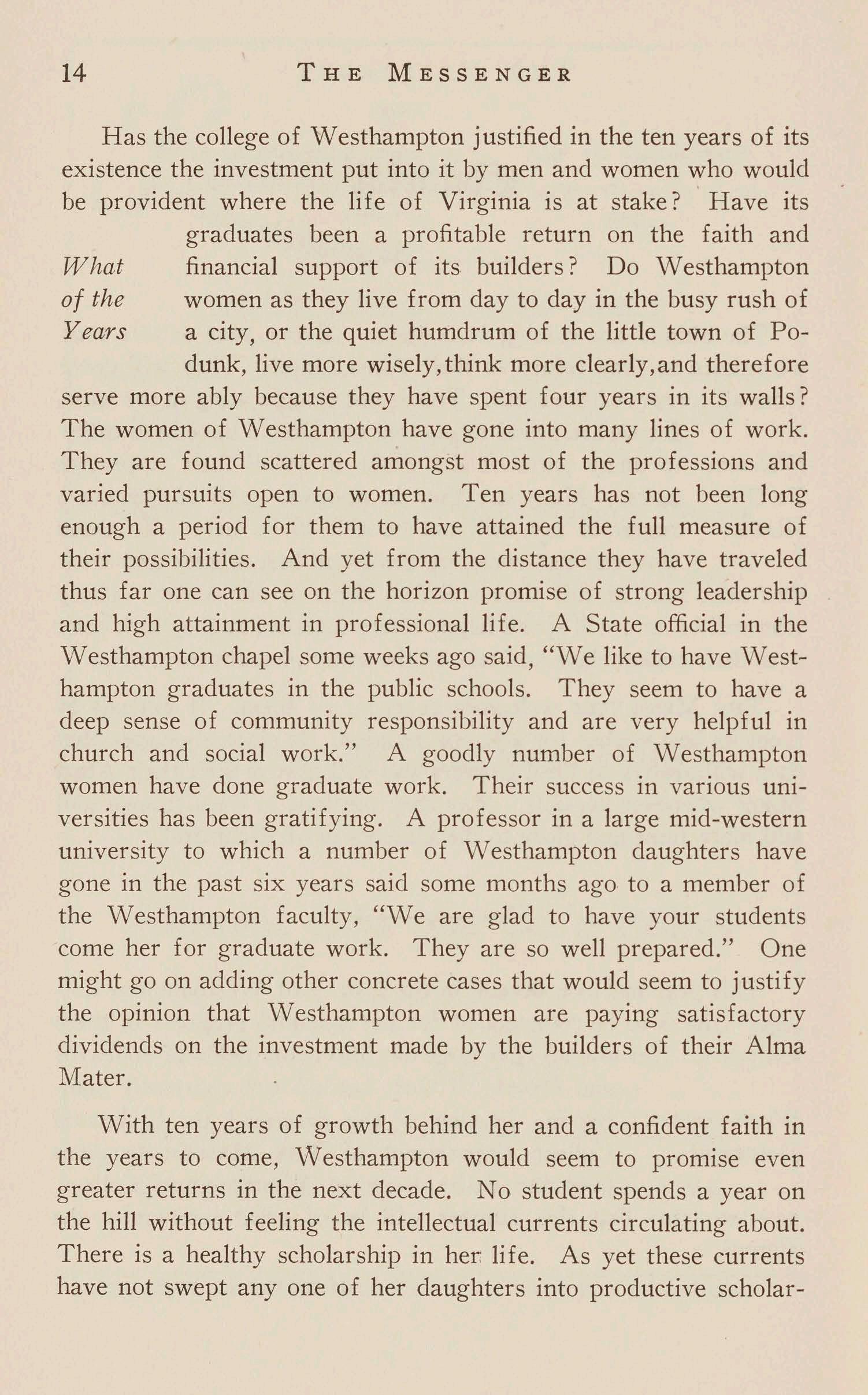
Has the college of Westhampton justified in the ten years of its existence the investment put into it by men and women who would be provident where the life of Virginia is at stake? Have its What of the Years graduates been a profitable return on the faith and financial support of its builders? Do Westhampton women as they live from day to day in the busy rush of a city, or the quiet humdrum of the little town of Podunk, live more wisely, think more clearly,and therefore serve more ably because they have spent four years in its walls? The women of Westhampton have gone into many lines of work. They are found scattered amongst most of the professions and varied pursuits open to women. Ten years has not been long enough a period for them to have attained the full measure of their possibilities. And yet from the distance they have traveled thus far one can see on the horizon promise of strong leader ship and high attainment in professional life. A State official in the Westhampton chapel some weeks ago said, "We like to have Westhampton graduates in the public schools. They seem to have a deep sense of community responsibility and are very helpful in church and socia l work." A goodly number of Westhampton women have done graduate work. Their success in various universities has been gratifying. A professor in a large mid-western university to which a number of Westhampton daughters have gone in the past six years said some months ago to a member of the Westhampton faculty, "We are glad to have your students come her for graduate work. They are so well prepared." One might go on adding other concrete cases that would seem to justify the opinion that Westhampton women are paying satisfactory dividends on the investment made by the builders of their Alma Mater.
With ten years of growth behind her and a confident faith in the years to come, Westhampton would seem to promise even greater returns in the next decade. No student spends a year on the hill without feeling the intellectual currents circulating about. There is a healthy scholarship in her. life. As yet these currents have not swept any one of her daughters into productive scholar-

ship or creative work that has attained recognition. But with time those of us who love her hope to see Westhampton women add to their strength leadership, that great quickening power that arises from the discovery of new truth and the creation of lasting beauty. M.
H. W.
For ten years our Westhampton has lorded over her piney hills and shadowy lake. In these ten years girls have come to her halls for knowledge and, having gained a bit, passed on into the world to put into practice there the ideals their Alma Mater had given them. Now her first decade has come to an end. From far and wide her daughters are looking back to Westhampton to see what she has done in the first years of her existence. This copy of THE MESSENGERhas been devoted to our alumni. In it we are trying to set before them a slight sample of Westhampton's progress.
W. H. S.
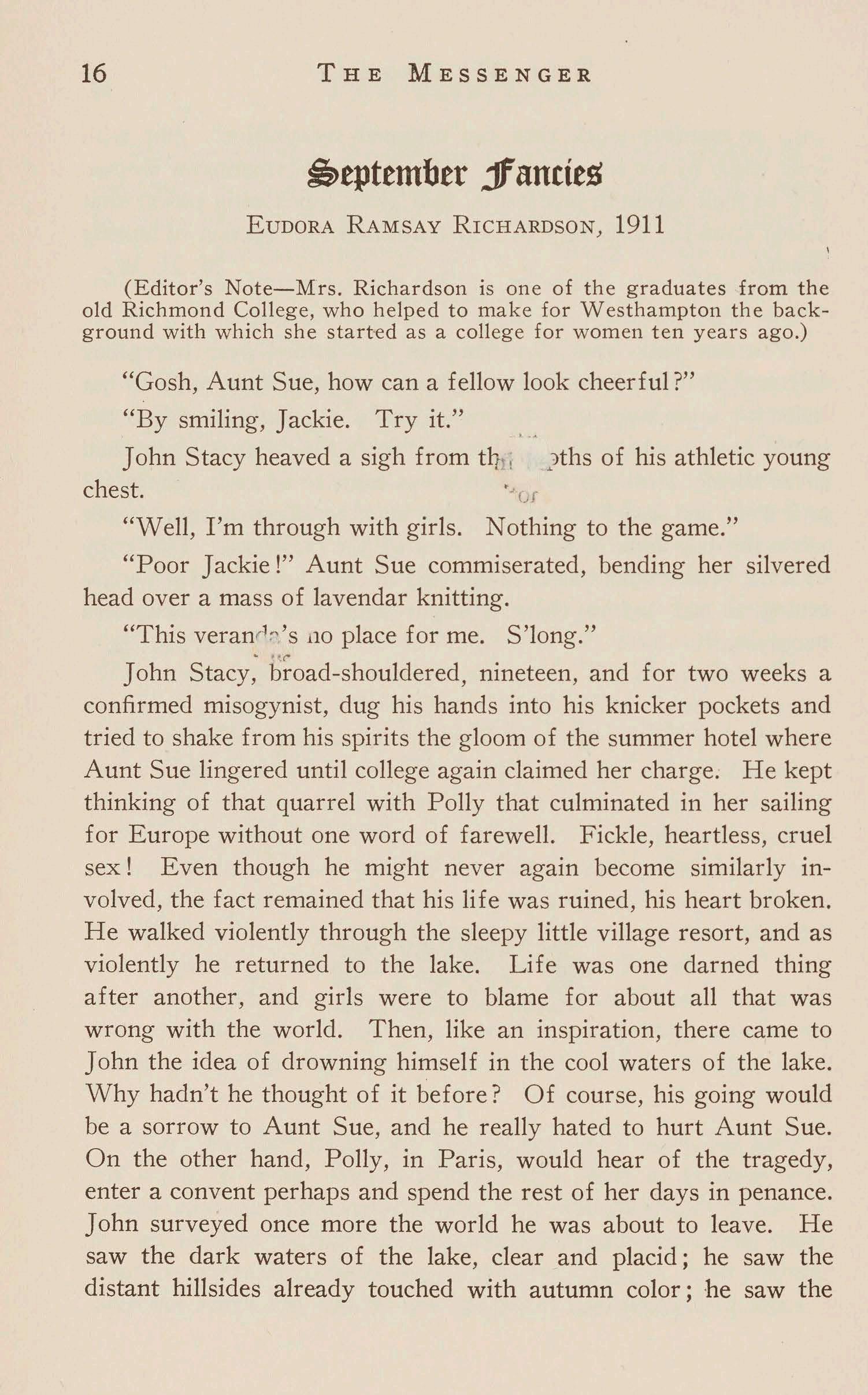
RAMSAY RICHARDSON, 1911
(Editor's Note-Mrs. Richardson is one of the graduates from the old Richmond College, who helped to make for Westhampton the background with which she started as a college for women ten years ago.)
"Gosh, Aunt Sue, how can a fell ow look cheerful?"
"By smiling, Jackie. Try it."
John Stacy heaved a sigh from th-ii chest. er ,-=>ths of his athletic young
"Well, I'm through with girls. Nothing to the game."
"Poor Jackie!" Aunt Sue commiserated, bending her silvered head over a mass of lavendar knitting.
"This veran r1~'s 110 place for me. S'long."
John Stacy; b;oad-shouldered, nineteen, and for two weeks a confirmed misogynist, dug his hands into his knicker pockets and tried to shake from his spirits the gloom of the summer hotel where Aunt Sue lingered until college again claimed her charge. He kept thinking of that quarrel with Polly that culminated in her sailing for Europe without one word of farewell. Fickle, heartless, cruel sex! Even though he might never again become similarly involved, the fact remained that his life was ruined, his heart broken. He walked violently through the sleepy little village resort, and as violently he returned to the lake. Life was one darned thing after another, and girls were to blame for about all that was wrong with the world. Then, like an inspiration, there came to John the idea of drowning himself in the cool waters of the lake. Why hadn't he thought of it before? Of course, his going would be a sorrow to Aunt Sue, and he really hated to hurt Aunt Sue. On the other hand, Polly, in Paris, would hear of the tragedy, enter a convent perhaps and spend the rest of her days in penance. John surveyed once more the world he was about to leave. He saw the dark waters of the lake, clear and placid; he saw the distant hillsides already touched with autumn color; he saw the
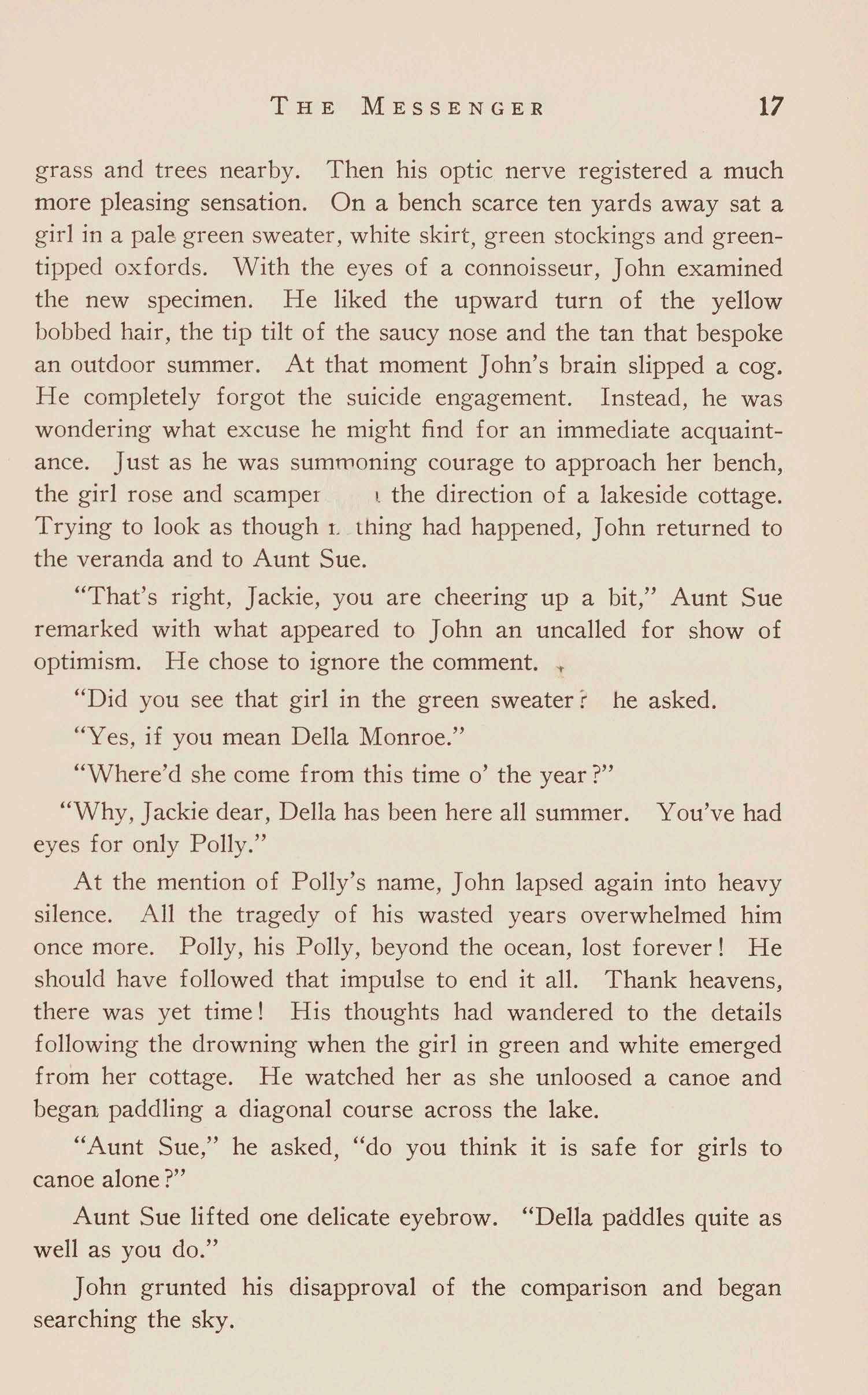
grass and trees nearby. Then his optic nerve registered a much more pleasing sensation. On a bench scarce ten yards away sat a girl in a pale green sweater, white skirt, green stockings and greentipped oxfords. With the eyes of a connoisseur, John examined the new specimen. He liked the upward turn of the yellow bobbed hair, the tip tilt of the saucy nose and the tan that bespoke an outdoor summer. At that moment John's brain slipped a cog. He completely forgot the suicide engagement. Instead, he was wondering what excuse he might find for an immediate acquaintance. Just as he was sumrrioning courage to approach her bench, the girl rose and scamper t the direction of a lakeside cottage. Trying to look as though r. thing had happened, John returned to the veranda and to Aunt Sue.
"That's right, Jackie, you are cheering up a bit," Aunt Sue remarked with what appeared to John an uncalled for show of optimism. He chose to ignore the comment. ..
"Did you see that girl in the green sweater r he asked.
"Yes, if you mean Della Monroe."
"Where'd she come from this time o' the year?"
"Why, Jackie dear, Della has been here all summer. You've had eyes for only Polly."
At the mention of Polly's name, John lapsed again into heavy silence. All the tragedy of his wasted years overwhelmed him once more. Polly, his Polly, beyond the ocean, lost forever! He should have followed that impulse to encl it all. Thank heavens, there was yet time! His thoughts had wandered to the details following the drowning when the girl in green and white emerged from her cottage. He watched her as she unloosed a canoe and began paddling a diagonal course across the lake.
"Aunt Sue," he asked, "do you think it is safe for girls to canoe alone?"
Aunt Sue lifted one delicate eyebrow. "Della paddles quite as well as you do."
John grunted his disapproval of the comparison and began searching the sky.

"Don't you think it looks threatening?" he asked.
Aunt Sue laid down her knitting and adjusted her distance glasses.
"Yes, Jackie, perhaps," she replied. "That's what you wanted me to say, isn't it?"
John left the veranda. Aunt Sue could be quite exasperating when she chose to impugn a fellow's motives. What reason could he have for wanting to save the life of Della Monroe except a decent distaste for having girls drown themselves before his very eyes? It was threatening. Any fellow with an ounce of manhood would follow that girl. John haughtily left Aunt Sue, selected a flat-bottom row boat and started in pursuit of Della. The girl had landed, tethered her canoe and disappeared before he reached the opposite shore. He drew his boat beside hers and waited. In a few moments, the girl returned with a package in her hands. She was smiling. John smiled, too.
"My aunt knows you," he explained. "We both thought the sky didn't look just right; so I followed. We can tow your skiff ."
"Awfully good of you," Della cooed. "I came for the eggs, and they might get broken in the bottom of the canoe."
"Anyway, it's a rescue," John grinned. "My name's John Stacy. I know yours."
"I've known yours all summer. I'm going to hold the eggs and loaf. I just love to watch you handle a boat."
John was pleased and looked it. This girl was all right. Crossing the deepest place in the lake, he remembered his desperate resolve of half an hour ago and wondered why he had been so wretched.
"I must take the eggs home for supper," Della announced after she had landed, and John thought he detected in her voice an agreeable note of regret.
"vVhat about my dropping around at eight?" he consoled. "There's a moon tonight."
"I'm on," the girl smiled, showing a very even row of teeth in a way that John entirely approved.

At supper J ohn squirmed under Aunt Sue's searching gaze. When someone spoke of the beauty of the day and Aunt Sue lifted her eyebrows and looked at him, John gulped down the remainder of his pudding and excused himself.
As a fair weather prophet, however, John left little to be desired. The night was all that he had predicted and more. On his way to Della's he paused long enough to see that a shaft of moonlight cut the waters of the lake into two half circles of midnight blue. As John breathed in the fragrance of the nightreminiscent as it was of summer nights not so long departed , yet hin t ing of the first tang of fall - he felt strangely happy. A few minutes later, looking with Della upon the romantic stillness of the lake, John forgot that there had been other girls and other nights.
"It simply kills me," he said, "to think how this summer has been wasted. We might have known each other all along."
Della smiled and was silent. John had never before known a girl who could be silent. He rather liked it.
"It ' s funny how a fellow just knows when a girl is made for him , isn't it?" he continued.
Still Della said nothing. Later John began to ponder these silences. He was pondering them the next morning while he and Della had an icy swim, and again that afternoon while they were canoeing, again while the two played desultory tennis, and he was still pondering that night while he and Della strolled on the shore.
"What makes you so quiet when I rave about you?" he asked. "Don ' t you like it?"
"Ye s , but I feel sort of guilty."
"Why guilty?"
"Well , you see, there was another fellow all summer, and I hate being fickle. He's gone abroad to study."
"It isn't being fickle when the big thing hits you. Gee whiz! How can we help it? I never was crazy about a girl this way before."

As John drew Della to him by the side of the moon-spattered lake, he meant every word he said. She was a sweet thing, sitting there with her hand in his, her little bobbed head on his shoulder. He turned her baby-like face up to his and kissed her on those soft red lips of hers, until just being silent was all she could do. At length with her rose petal cheek against his, she said gently, "Maybe you're right."
"Do you know," Jack reminded Della dolefully, "that we have only three more days together before they yank me back to college and you to that boarding school prison? We must live those days fully."
John had the feeling that he had read that last sentence somewhere. Nevertheless, he liked the way it sounded, and he thought that Della seemed to like it, too.
If fullness is to be reckoned by the number of things one does, John and Della did live those last days fully. They swam, boated, golfed, played tennis, and strolled by sunset and by moonlight. In the ecstasy of the many glorious presents, John almo.st forgot the tragic parting that each moment grew nearer. On the evening of the last day, however, as he leaped up Della's steps, a glimmer of realization began to seep through his consciousness. Then, as he waited for Della to come down, great waves of anguish swept over him. Della came at last, more radiant than ever in a daring Mah Jong dress-worn perhaps that its gayness might enliven a trying situation. She threw over his arm a flame colored wrap with a deep fox collar. John folded the shimmering, soft thing in his arms. He loved Della's things as he loved Della. They exhaled her fragrance, gave off some of the charm that was hers at all times.
"We've got to go to the post office, Jack," she said. "Mother is expecting a letter."
The two ran up the hill like children and burst into the deserted post office. Della was still fumbling with her combination when John drew from his box a letter. The boy's face went deadly white, for the envelope bore Polly's careless scrawl.

"Nothing in my box," Della announced. "Oh, excuse me. Go 011 and read your letter."
A letter from Polly! What on earth would he do if she were about to make up with him? With trembling fingers John opened the envelope. Oh, it was all right! Heavens, what luck!
"Della, Della," he said, "it's from Polly, the girl I played around with all summer, you know. Listen!
"DEAR JACK :
"Won't you do something for me? You see George Harris was on the boat coming over. He and I are now as happy as two people can be, except that George is so worried about Della Monroe, the girl he went with this summer. I know you won't mind telling Della for us. She's still at the lake. Please, Jack, look her up. I'd do as much for you.
"As ever, "POLLY."
John waited for the applause which it seemed to him should mark Della's approval of the letter. What was the matter with Della? He had never seen her look like that before.
"Isn't that a weight off your conscience?" he asked.
Instead of answering, the girl was running down the post office steps and out into the night. John followed to the Monroe veranda, where he found Della, face downward in the swing, sobbing.
"Go away," she shrieked. "Y-you are all alike. You'd £-forget me as y-you forgot Polly, as G-George forgot me. Go away."
Jack shifted from one foot to another in terrible uncertainty. What did a fell ow do when a girl had hysterics? vVhat was he supposed to do? He was honestly frightened. If he could only escape! When Della ran into the house and banged the door behind her, John heaved a sigh of relief. Then he waited. Would she come back? Heaven knows he didn't want her to. Maybe she would bring her mother with her. Then John turned from the swing and fled down the steps and back to his hotel. He
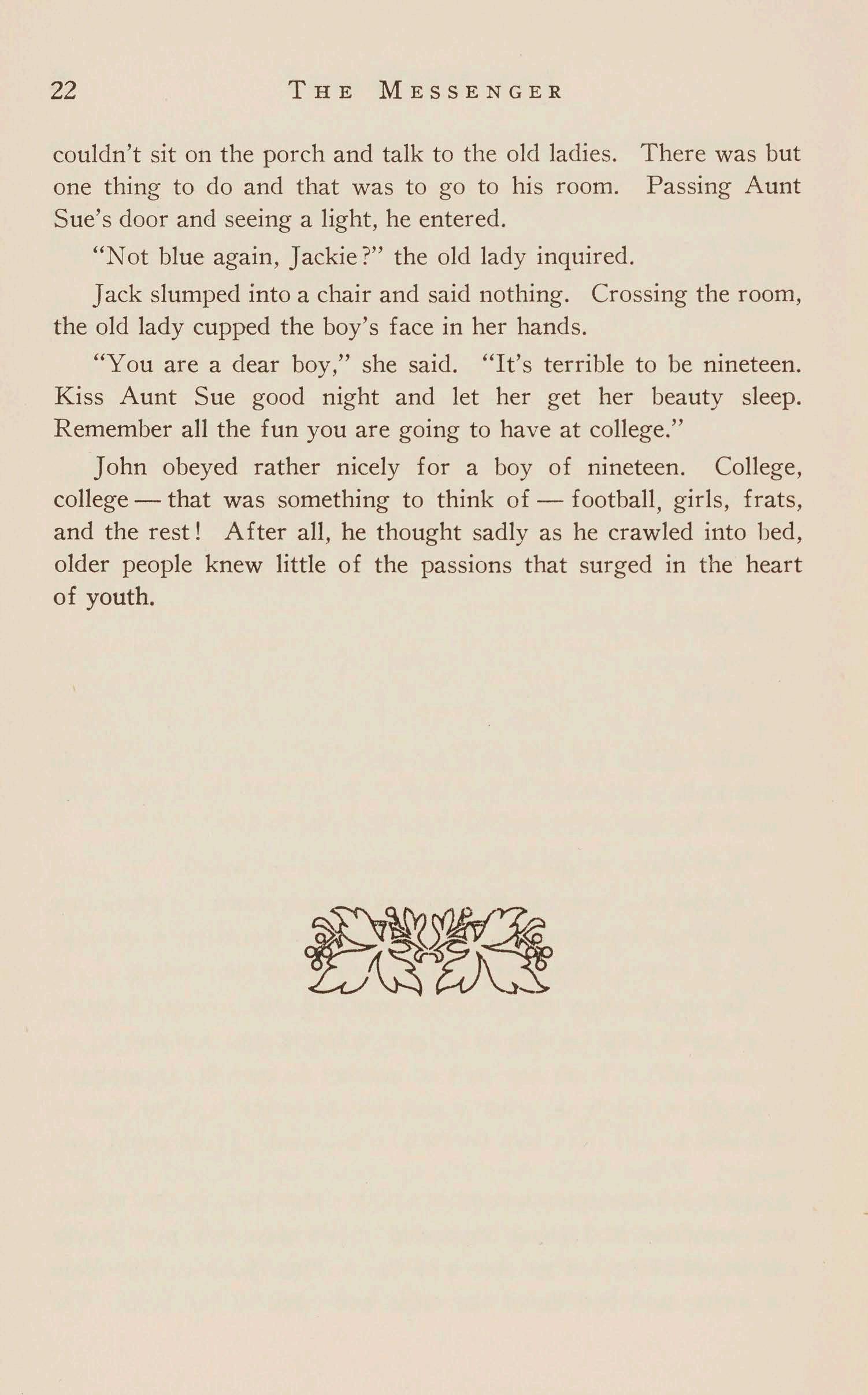
couldn't sit on the porch and talk to the old ladies. There was but one thing to do and that was to go to his room. Passing Aunt Sue's door and seeing a light, he entered.
"Not blue again, Jackie?" the old lady inquired.
Jack slumped into a chair and said nothing. Crossing the room, the old lady cupped the boy's face in her hands.
"You are a dear boy," she said. "It's terrible to be nineteen. Kiss Aunt Sue good night and let her get her beauty sleep. Remember all the fun you are going to have at college."
John obeyed rather nicely for a boy of nineteen. College, college -that was something to think of -football, girls, frats, and the rest! After all, he thought sadly as he crawled into bed, older people knew little of the passions that surged in the heart of youth.
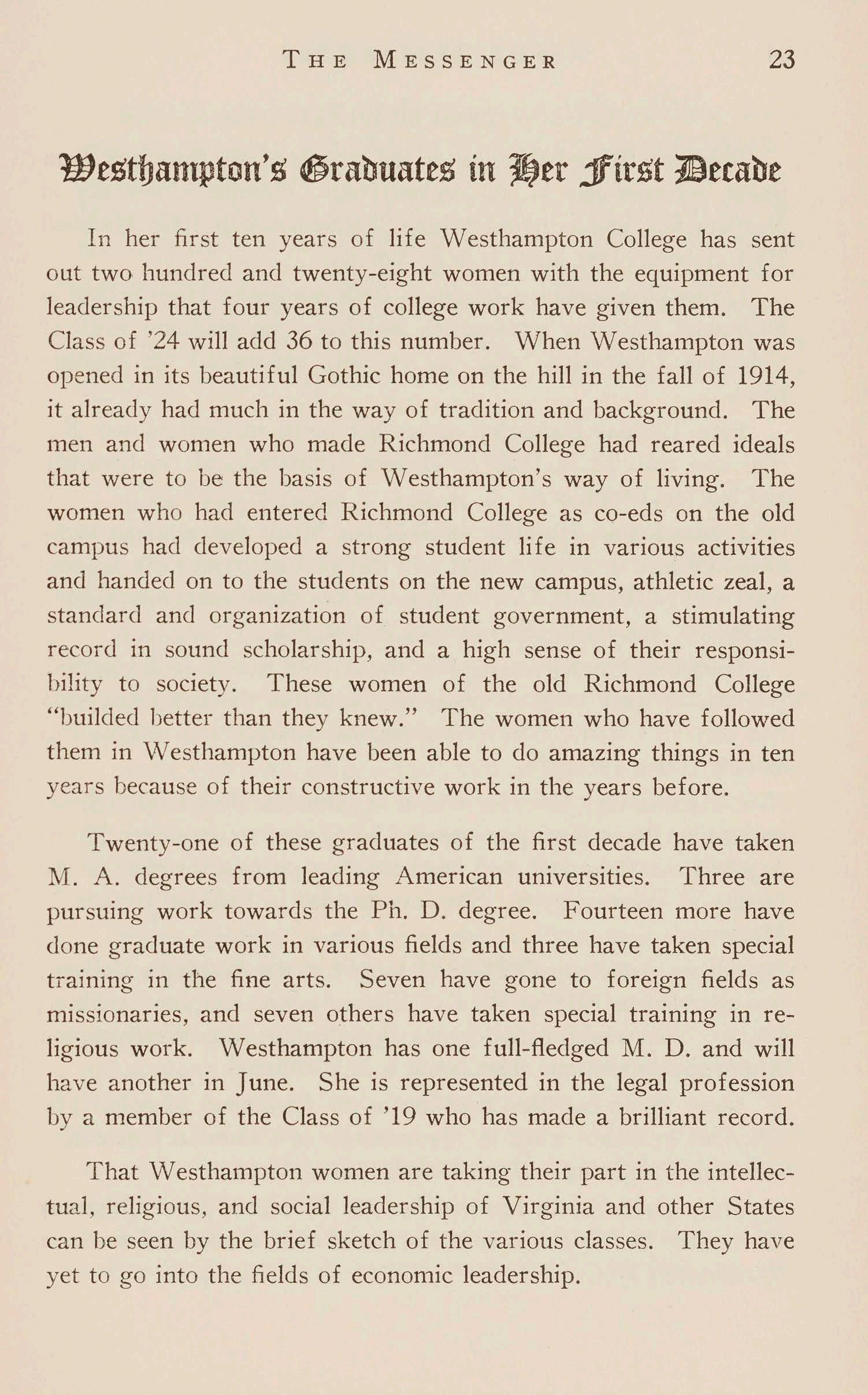
In her first ten years of life Westhampton College has sent out two hundred and twenty-eight women with the equipment for leadership that four years of college work have given them. The Class of '24 will add 36 to this number. When Westhampton was opened in its beautiful Gothic home on the hill in the fall of 1914, it already had much in the way of tradition and background. The men and women who made Richmond College had reared ideals that were to be the basis of Westhampton's way of living. The women who had entered Richmond College as co-eds on the old campus had developed a strong student Iif e in various activities and handed on to the students on the new campus, athletic zeal, a standard and organization of student government, a stimulating record in sound scholarship, and a high sense of their responsibility to society. These women of the old Richmond College "builded better than they knew." The women who have followed them in Westhampton have been able to do amazing things in ten years because of their constructive work in the years before.
Twenty-one of these graduates of the first decade have taken M. A. degrees from leading American universities. Three are pursuing work towards the Ph. D. degree. Fourteen more have done graduate work in various fields and three have taken special training in the fine arts. Seven have gone to foreign fields as missionaries, and seven others have taken special training in religious work. Westhampton has one full-fledged M. D. and will have another in June. She is represented in the legal profession by a member of the Class of '19 who has made a brilliant record.
That Westhampton women are taking their part in the intellectual, religious, and social leadership of Virginia and other States can be seen by the brief sketch of the various classes. They have yet to go into the fields of economic leadership.
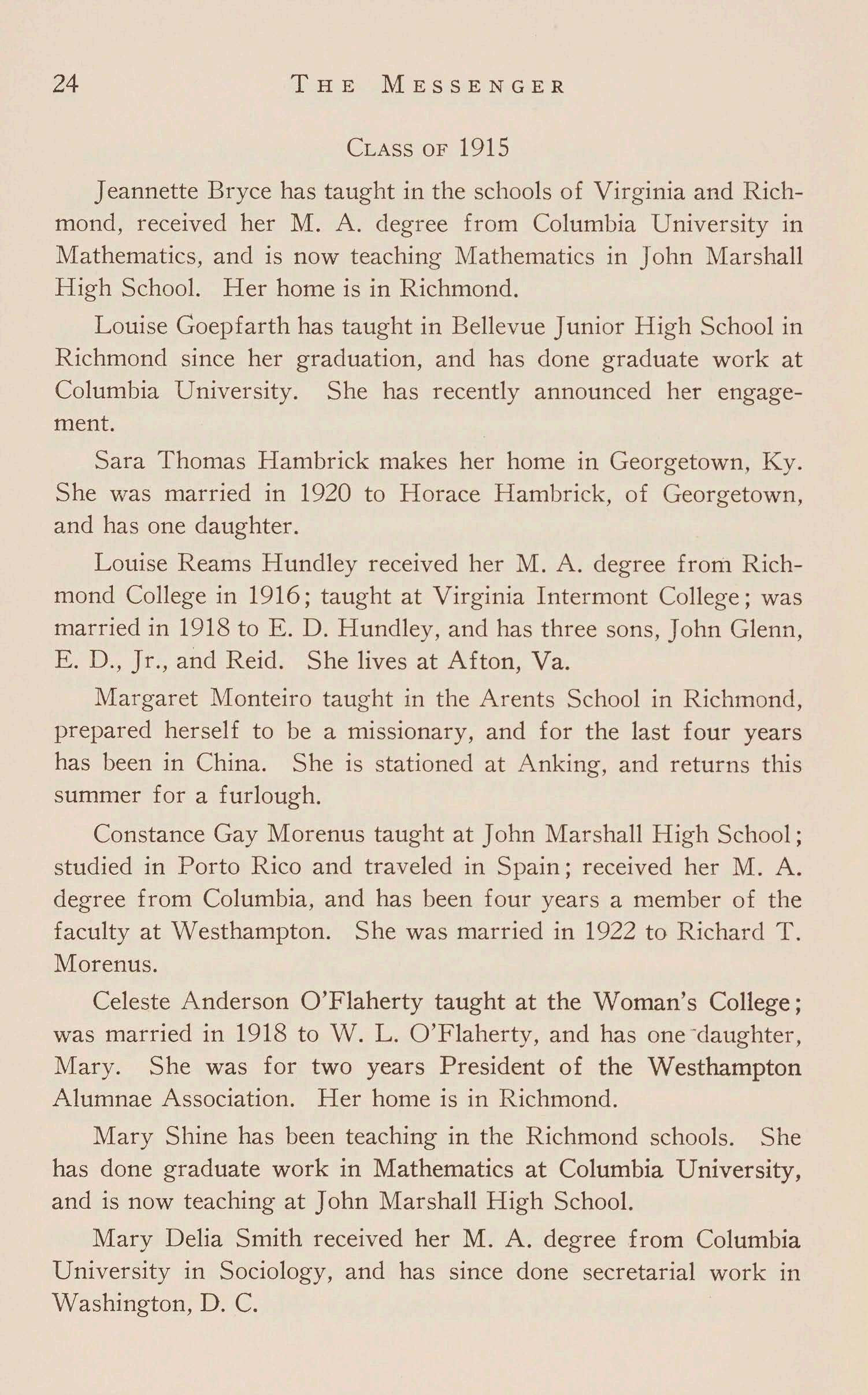
Jeannette Bryce has taught in the schools of Virginia and Richmond , received her M. A. degree from Columbia University in Mathematics, and is now teaching Mathematics in John Marshall High School. Her home is in Richmond.
Louise Goepfarth has taught in Bellevue Junior High School in Richmond since her graduation, and has done graduate work at Columbia University. She has recently announced her engagement.
Sara Thomas Hambrick makes her home in Georgetown, Ky. She was married in 1920 to H orace Hambrick, of Georgetown, and has one daughter.
Louise Reams Hundley received her M.A. degree from Richmond College in 1916; taught at Virginia Intermont College; was married in 1918 to E. D. Hundley, and has three sons, John Glenn, E. D., Jr., and Reid. She lives at Afton, Va.
Margaret Monteiro taught in the Arents School in Richm ond, prepared herself to be a missionary, and for the last four years has been in China. She is stationed at Anking, and return s this summer for a furlough.
Constance Gay Morenus taught at John Marshall High School; studied in Porto Rico and traveled in Spain; received her M. A. degree from Columbia, and has been four years a member of the faculty at Westhampton. She was married in 1922 to Richard T. Morenus.
Cele ste Anderson O'Flaherty taught at the Woman's College; was married in 1918 to W. L. O'Flaherty, and has one -daughter, Mary. She was for two years President of the Westhampton Alumnae Association. Her home is in Richmond.
Mary Shine has been teaching in the Richmond schools. She has done graduate work in Mathematics at Columbia University, and is now teaching at John Marshall High School.
Mary Delia Smith received her M. A. degree from Columbia University in Sociology, and has since done secretarial work in Washington, D. C.

Ethel Smither taught in the Richmond public schools. She did graduate work at Columbia in Biology, and taught Biology at John Marshall High School. Later she became a special Sunday School supervisor for the M. E. Church, South, and has also done graduate work in Religious Education at Columbia and Chicago Universities. Her headquarters are in Richmond. She was for four years President of the Westhampton Alumnae Association.
Irene Stiff has taught since her graduation, and has done graduate work at Columbia University. Her home is at Centre Cross, Va.
Sallie Wills Holland, President of '16, has been in the English Department of Coker College for the past four years. Before that she taught in Virginia and spent one winter in Flint, Mich. She has studied for several summers at Columbia University.
Kathleen Bland has followed her scientific bent, so evident in her college days. She taught for several years, and then was with the government as a seed analyst. She was stationed for a time in Missouri, but has returned to Washington.
Stella Carden is planning to study at Northwestern University this summer, after a year of teaching in the high school at Latrobe, Pa. For several years she managed a tea room at the University of West Virginia, and was later traveling secretary for a Chatauqua Bureau.
Helen Mansell taught for a year at Warrenton, Va., and then took a position as secretary with the State Board of_ Education. She spent two years in New York studying at Columbia, where she received the M. A. degree in English, and doing some educational research work with a New York bureau. She returned to Richmond two years ago, and is registrar and secretary to the Dean of Richmond College. Stories and articles from her pen are appearing in various periodicals, and she is devoting her leisure time largely to writing.
Elizabeth Hutchinson has had a civil service position in Washington since a period of several years spent in teaching.

Margaret James has followed a musical career that was already well advanced in her college days. She taught piano several years in Richmond; studied in New York and has been in the Department of Music at Greenville Woman's College the past year.
Norma Woodward continued after her graduation her work in Mr. Tabb's office, and after several years was married to Charles W. Throckmorton, Jr. She has two little daughters and lives at her old home in Ginter Park.
Frieda Dietz entered upon a journalistic career just after leaving Westhampton; was on the staff of a Richmond daily; spent a winter writing in New York, and then married Ernest Pollard, a Richmond newspaper man. She is living in Richmond, and continues her writing.
Maude Woodfin has taught continuously since leaving college, except for a year spent studying at the University of Chicago, where she received her M. A. degree in History. The first several years she was at Blackstone College for Girls, later at Central College in Arkansas and for the past four years has been on the faculty of Westhampton College.
The Class of '17 has the unique distinction of -being the only class that has not a single representative living in Richmond.
Florence Smith, President of the class, has traveled further toward a Ph. D. degree than any woman who has gone out in the past ten years from Westhampton. She has finished her residence requirement for that degree at the University of Chicago, and has been spending the past year at her home in Raleigh working on her thesis. She goes in September to Greensboro, N. C., to teach in the Department of History at the North Carolina College for Women.
Florence Boston taught at her home town, Warrenton, for several years; married Dr. Henry Decker and has been engaged with him in missionary work in China since then. She has two sons.

Eleanor Decker has taught and studied at the Louisville Training School. She has been teaching near her home the past year and living with her mother and father.
Olivia Gwaltney has been for some years keenly interested in her work as a teacher in the Buchanan Mountain School.
Gladys Holleman taught for several years at her home, and married Mr. Gordon Barlow. She is living on their farm near Smithfield, and has a son just about a year old.
Ruth Elliott has been teaching in the high school at South Boston for several years. She has studied in the summer at the Modern Language School at Middlebury, Vt.
Nannie Sydnor has gone into dramatic coaching in Cambridge, and has been studying in the Harvard 47 workshop. Before leaving Richmond about four years ago, she taught at John Marshall High School.
Catesby Willis taught for several years and since then has been at her home in Fredericksburg.
Ruth Puckett was married last year to Mr. W. G. Wysor, and is living in Richmond. Before her marriage she had a secretarial position at V. P. I.
Lula Puckett was man)ed several years ago to Mr. J. Caldwell (Tiny) Wicker, and is living at Milligan College, Tenn.
Eleanor Copenhaver spent several years at Bryn Mawr, doing graduate work in Sociology. She is a Y. W. C. A. secretary, and is at present in the North Central Field.
Ruth Harris is with the Y. W. C. A. at Kuhling, China, where she has been for the past four years. Before leaving this country she was secretary at the local Y. W. C. A. in Council Bluffs, Ia .
Katherine Love taught a year or so at Anderson College, spent a year in graduate work in the University of Chicago, and has since been engaged in chemical work in the government laboratories in Washington.
Elizabeth Bland Brockenbrough first entered the Actuary Department of the Life Insurance Company of Virginia. Later she
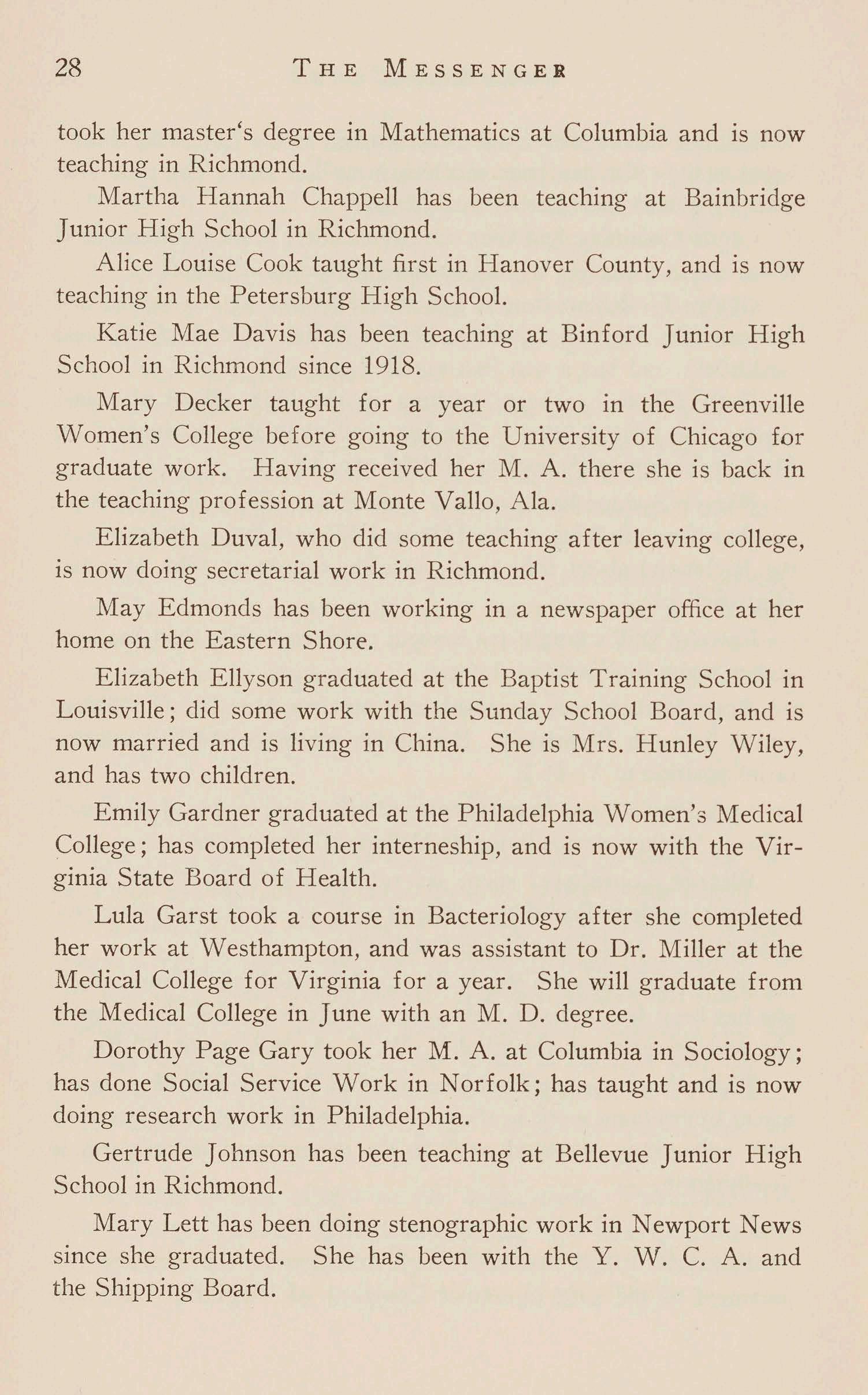
took her master's degree in Mathematics at Columbia and 1s now teaching in Richmond.
Martha Hannah Chappell has been teaching at Bainbridge Junior High School in Richmond.
Alice Louise Cook taught first in Hanover County, and is now teaching in the Petersburg High School.
Katie Mae Davis has been teaching at Binford Junior High School in Richmond since 1918.
Mary Decker taught for a year or two in the Greenville Women's College before going to the University of Chicago for graduate work. Having received her M. A . there she is back in the teaching profession at Monte Vallo, Ala .
Elizabeth Duval, who did some teaching after leaving college, is now doing secretarial work in Richmond.
May Edmonds has been working in a newspaper office at her home on the Eastern Shore.
Elizabeth Ellyson graduated at the Baptist Training School in Louisville; did some work with the Sunday School Board, and is now married and is living in China. She is Mrs. Hunley Wiley, and has two children.
Emily Gardner graduated at the Philadelphia Women's Medical College; has completed her interneship, and is now with the Virginia State Board of Health.
Lula Garst took a course in Bacteriology after she completed her work at Westhampton, and was assistant to Dr. Miller at the Medical College for Virginia for a year. She will graduate from the Medical College in June with an M. D. degree.
Dorothy Page Gary took her M. A. at Columbia in Sociology; has done Social Service Work in Norfolk; has taught and is now doing research work in Philadelphia.
Gertrude Johnson has been teaching at Bellevue Junior High School in Richmond.
Mary Lett has been doing stenographic work in Newport News since she graduated. She has been with the Y. W. C. A. and the Shipping Board.

Estelle Kemper went into government work in Washington at first, but is now running a tea room in Wiscasset, Maine. She is u sing mountain girls in her work, thus giving them a chance to learn a profession. She is Mrs. Henry Butler.
Elizabeth Love has been teaching since 1918. She was at West Point, Va., for a time, but is now at John Marshall High School in Richmond, Va.
Deborah McCarthy first held a government position in Washington, and since then has been teaching. She taught in Covington, Va., at one time and is now in Henderson, N. C.
Eleanor McCarthy took a course in Bacteriology in North Carolina; later worked at Stuart Circle Hospital in Richmond, and after teaching a year at Front Royal, Va., is now teaching in Richmond.
Elizabeth Moncure became an actuary at the Life Insurance Company of Virginia in 1918. Later she was at the Better Business Bureau for a few months, and went from there to be secretary at the School for Social Service. She is now filling the role of homemaker at her home in Richmond.
Jennie Phillips has alternated between staying at home and teaching in Asheville, N. C.
Nellie Phipps is teaching in Virginia.
Mary Porter worked with the Presbyterian Publishing Co. for a time. Now she is Mrs. William Rankin, and is living at Toano, Va., enjoying the simple country life.
Lillian Ransone is now Mrs. D. N. Tucker, of Hampton, Va.
Lois Rogers taught at Bainbridge Junior High School in Richmond until she was married. She is Mrs. Frank Butler, and is living in Richmond.
Mary Denmead Ruffin has been teaching, with the exception of a year, at Chicago, where she received her M. A. in History. She is now at the Collegiate School, Richmond.
Elizabeth Waddill has a government position in Washington.
Kathleen Watkins is now Mrs. R. L. Peck, of Troutville, Va.

News from '19 must be gathered from variou s parts of Virg inia, from several distant Southern States, and ev en from fara wa y China. To members of a war cla ss, however, wh o , during t hei r Senior year, went to lectures held on the second floor of a p ublic garage, who sat in chapel und er the awe -in spiring sy mbol s of an Odd Fellows' hall , whose dormitories were private r e siden ces scatter ed over the city , who arranged to see each oth er by lea v in g messages with the traffic office r at Laurel and Franklin,-to a cla ss trained in such tradition, di stance is no barrier to real unity o f spirit.
Juliette Brown, '19's President, is now Mrs. Webster Carpenter, of Norfolk. Little Pamela Brown Carpenter is the holder o f ' 19's baby cup.
Virginia Bundick has taught since leaving college. She is now o n the faculty of the Petersburg High School.
Isabel Field taught at Emporia and Crozet, Va ., and she is now at Hampton.
Elizabeth Gaines has been a Y. W. C. A. secretary, a graduate student at Columbia University, and librarian in the Reading Room at Westhampton College.
Virginia Gay has taught successfully at Jefferson High School, Suffolk, and Bellevue Junior High School, Richmond.
After graduation from Westhampton, Helen Hancock took a course in a business college and went into an advertising office. Later she became Mrs. Palmer Maury Hundley, of Richmond.
After teaching several years in the high school at Crewe, Va., Esther Jenkins became Mrs. George E. Cheatham.
Virginia Jones has taught at her home, Carys brook, Va., and at Charlottesville. She is now principal of the high school at Palmyra, Va .
Virginia Karnes is Mrs. J. W. Wright, of Roanoke.
Soon after graduation Margaret Laws became Mrs. John William Decker and went to China as a missionary. The Class of '19

hopes at a near commencement to have Master John Laws Decker and his small brother, Master William Marshall Decker, as its honored guests.
Edith Sydnor has taught in the high school at Chase City, and more r ecently has been a member of the faculty at John Marshall High School. She has found time, also, to capture a Master's degree from Columbia University.
In November, 1923, Hester Tichenor became Mr s. F ranci s Boddie 'Warfield. Her husband is an architect in Nash ville. Before her marriage she studied music in New York City.
Elizabeth Tompkins has distinguished the Class of '19 by winning two degrees. She is an M. A. of Columbia University and a LL. B. of the University of Virginia. Nineteen was proud of her, too, when she attained the highest grade in the history of the State Bar examinations. Now she is practicing law in Charlottesville.
Frances Woodson is a chemist at the Richmond Filtration Plant.
Janet Wyatt spent a year at Columbia University; taught for several years in the Talcott School, Richmond, and in November , 1923, became Mrs. William Maynard Fountain, of Greenwood, Miss.
Four years ago the Class of '20 started out to pursue as mdividuals varied careers. A number have gone into the prof ession of homemaking, and there is to be at least one more June bride among us this year.
Sallie Adkisson was married several years ag to Mr. Wilbur Ryland, and is living at Urbanna.
Frances Shipman is teaching at West Point.
Gazelle Stubbs (Mrs. Robert Smith) lives in Norfolk, and 1s the mother of the famous "first daughter" of the class.
. Marie Crowder is teaching in Covington.

Frances Shumate is teaching at Averett College m Danville, and is a member of the State Normal School Board.
Kitty Vaughan taught for several years in the Richmond Schools, and was married last summer to Mr. Clodius Willis. She has a two months' old daughter, Julia Somerville.
Kathryn McGlothlin has recently recovered from a severe illness, and is assistant librarian at Furman University. She has her M. A. from Columbia.
Martha Walden, after studying at the Training School in Louisville, Ky., is doing very valuable work on an Indian reservation near Malcolm, Ga.
Lucy Wright has her M. A. from Columbia, and is teaching in John Marshall High School.
Jeffries Heinrich has taught at John Marshall since leaving college.
Philena Vaughan is teaching at Bellevue Junior High in Richmond.
Mary Guest taught at Marion, Va., just after leaving college and then spent a year at the University of Chicago, receiving her M. A. degree. She was married about two years ago to Mr. Beattie Gywnn, of Marion, Va.
Ruth Cunningham is in the Bacteriological Laboratories of the City and State Health Departments in Richmond.
Mary McDaniel is teaching at the Collegiate School in Richmond. She is to be married in June to Mr. Alec Parker, and will live at Westhampton.
Jeannette Freeman ( Mrs. Charles Minor) is taking her M. A. degree from Columbia this June, when her husband graduates in law from the same university.
Blanche Morgan is also in New York, leading a varied and interesting existence, though we are unable to be certain whether she is teaching or acting at present.
Ruth Carver ( Mrs. Norfleet Gardner) is busy being an ideal minister's wife in Pendleton, N. C. She is also the mother of one of our class daughters.
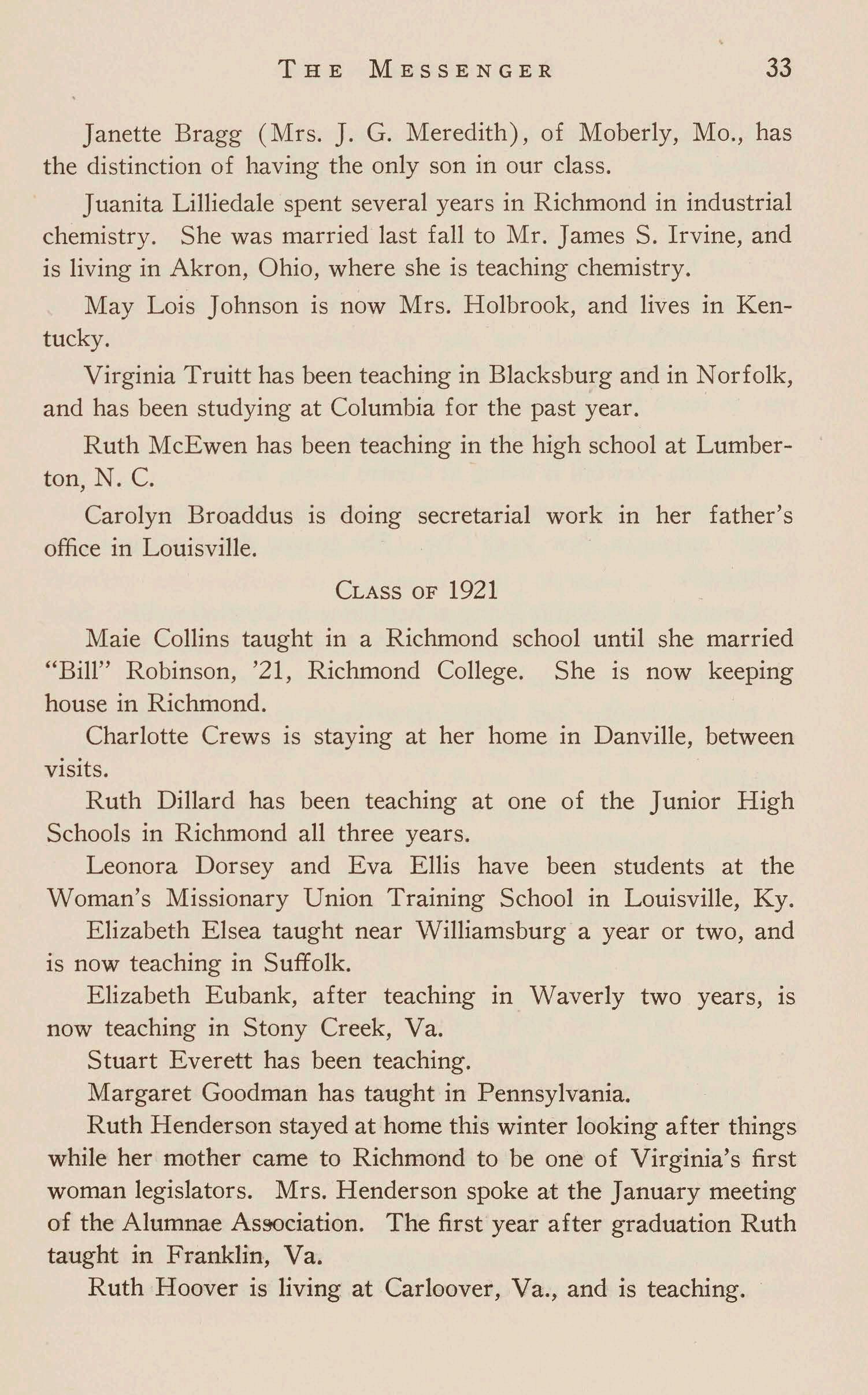
Janette Bragg (Mrs. J. G. Meredith), of Moberly, Mo., has the distinction of having the only son in our class.
Juanita Lilliedale spent several years in Richmond in industrial chemistry. She was married last fall to Mr. James S. Irvine, and is living in Akron, Ohio, where she is teaching chemistry.
May Lois Johnson is now Mrs. Holbrook, and lives in Kentucky.
Virginia Truitt has been teaching in Blacksburg and in Nor folk, and has been studying at Columbia for the past year.
Ruth McEwen has been teaching in the high school at Lumberton, N. C.
Carolyn Broaddus is doing secretarial work in her father's office in Louisville.
Maie Collins taught in a Richmond school until she married "Bill" Robinson, '21, Richmond College. She is now keeping house in Richmond.
Charlotte Crews is staying at her home in Danville, between visits.
Ruth Dillard has been teaching at one of the Junior High Schools in Richmond all three years.
Leonora Dorsey and Eva Ellis have been students at the Woman's Missionary Union Training School in Louisville, Ky.
Elizabeth Elsea taught near Williamsburg a year or two, and is now teaching in Suffolk.
Elizabeth Eubank, after teaching in Waverly two years, is now teaching in Stony Creek, Va.
Stuart Everett has been teaching.
Margaret Goodman has taught in Pennsylvania.
Ruth Henderson stayed at home this winter looking after things while her mother came to Richmond to be one of Virginia's first woman legislators. Mrs. Henderson spoke at the January meeting of the Alumnae As~ciation. The first year after graduation Ruth taught in Franklin, Va.
Ruth Hoover is living at Carloover, Va., and is teaching.
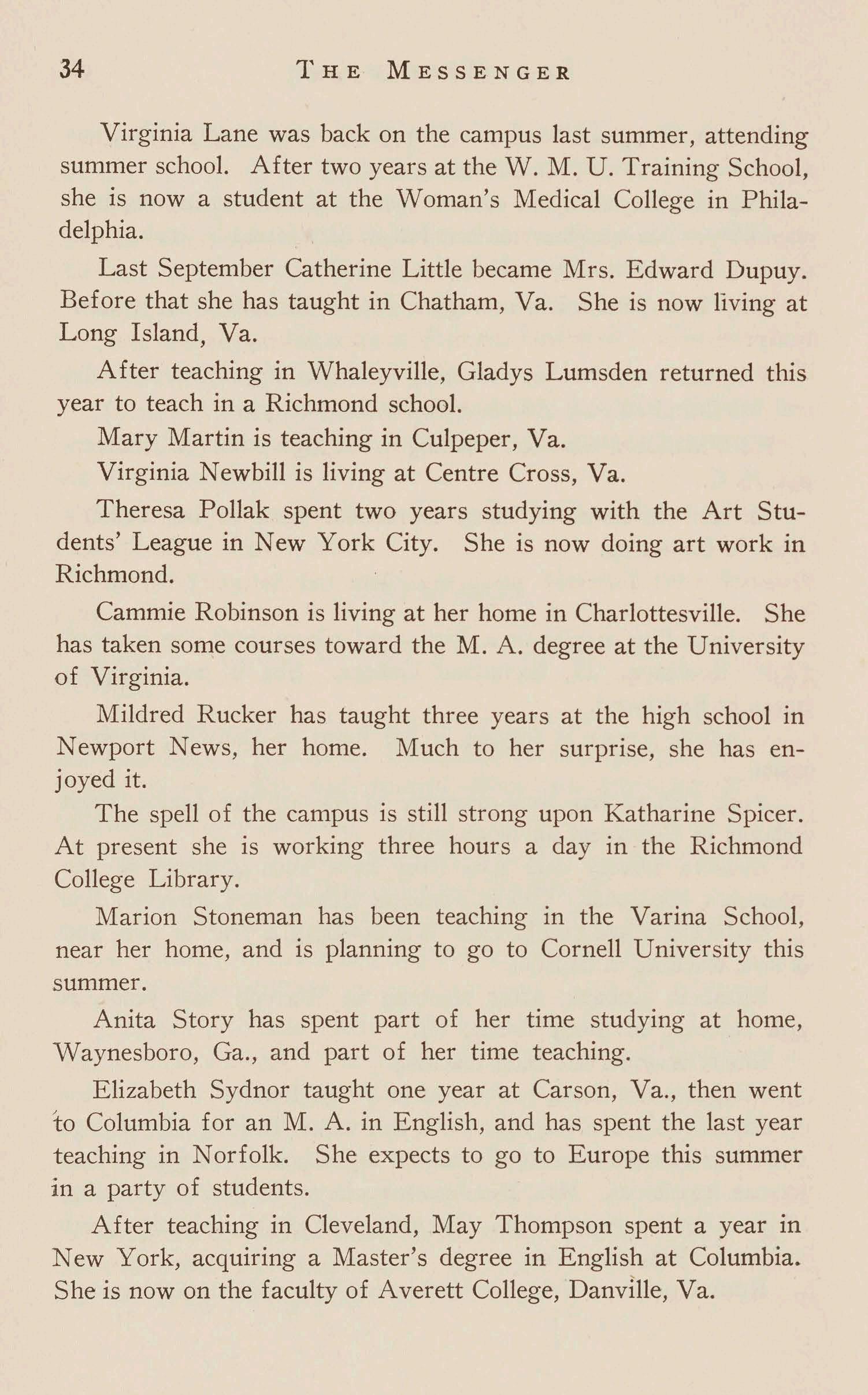
Virginia Lane was back on the campus last summer, attending summer school. After two years at the W. M. U. Training School, she is now a student at the Woman's Medical College in Philadelphia.
Last September Catherine Little became Mrs. Edward Dupuy. Before that she has taught in Chatham, Va. She is now living at Long Island, Va.
After teaching in Whaleyville, Gladys Lumsden returned this year to teach in a Richmond school.
Mary Martin is teaching in Culpeper, Va.
Virginia Newbill is living at Centre Cross, Va.
Theresa Pollak spent two years studying with the Art Students' League in New York City. She is now doing art work in Richmond.
Cammie Robinson is living at her home in Charlottesville. She has taken some courses toward the M. A. degree at the University of Virginia.
Mildred Rucker has taught three years at the high school in Newport News, her home. Much to her surprise, she has enjoyed it.
The spell of the campus is still strong upon Katharine Spicer. At present she is working three hours a day in the Richmond College Library.
Marion Stoneman has been teaching in the Varina School, near her home, and is planning to go to Cornell University this summer.
Anita Story has spent part of her time studying at home, Waynesboro, Ga., and part of her time teaching.
Elizabeth Sydnor taught one year at Carson, Va., then went to Columbia for an M. A. in English, and has spent the last year teaching in Norfolk. She expects to go to Europe this summer in a party of students.
After teaching in Cleveland, May Thompson spent a year in New York, acquiring a Master's degree in English at Columbia. She is now on the faculty of Averett College, Danville, Va.

Alice Williams taught at Round Hill two years. She has spent the last year in Cambridge, Md.
Josephine Williams taught at the Lincoln School, near Round Hill, for two years. Resting and recuperating after an operation has occupied her during the last year.
Mary Hart Willis is teaching in Petersburg now. She comes to Westhampton occasionally to visit her sister, Sallie Gordon Willis.
The ever-needy field of school teaching has called to itself a majority of '22.
Valeria Arrington and Lucile Ledman are teaching in Nor folk. Celia Levinson, Josephine Talley, Claudia Patrick and Juliet Woodson are teaching in Richmond, Mary Bristow at Wakefield, Reba Dudley in Roanoke, Mary Fugate in Wakefield, Alice Garnett in Maryland, Jeanette Henna at Marion, Elizabeth Herrin at Zuni, Stella Hubbard in Danville, Lilias Hutchins in Portsmouth, Mildred Kline at Oxford College, Oxford, N. C., Dandridge Lambert at South Hill, Hilda Lawson at Franklin, Rebecca Lawson at West Point, Elva McAlister in Virginia, Mary Rilee at Elkhart, Julia Roop in Radford, Inita Russell at Oxford College, N. C., Muriel Sanders at Suffolk, Leslie Sessoms in Richmond, Margaret White at McKinney, Elizabeth Williams in Portsmouth, Dorothy Winfrey at Emporia, Narcissa Daniel in Weldon, N. C., Anna and N arcissa Riddick in Raleigh, Louise Shipman in High Point, N. C., Ida Story in Waynesboro, Ga., Louise Duke in Tampa, Fla.
Gladys Booth was married to Mr. Frank Bentley, Jr., the summer after leaving college and is living in Tampa, Fla.
Gladys Shaw did journalistic work with a Richmond daily, and last summer was married to Mr. Carter Taylor. She is living in Atlanta and is continuing her journalistic work.
Dorothy Thomas was married in the autumn of '22 to Dr. John M. Davis, and is living in Lynchburg.
Margaret Hooker went to the Training School in Louisville, and then was married to Mr. John Lawrence Slaughter. She is living in Buffalo, Ky.

Winifred Walker has completed her work for the M.A. degree in Chemistry from Columbia University, and sailed about a month ago for the Orient. She will spend the summer traveling with her mother, and will be married in China in the autumn.
The business world, too, has claimed its share of recruits from the ranks of '22.
Thelma Hill has done considerable coaching along dramatic lines, and is now working with her brother in the work of getting out the Richmond city directory.
Virginia Moncure is doing secretarial work with the Richmond School of Social Service.
Virginia Richardson is secretary to a patent attorney in Washington.
Elsie Ware is a secretary in one of the departments of the State Board of Education.
A professional career has called Louise Story. She is a Laboratory Technician in Richmond.
Zola Leek has been studying at the Training School in Louisville.
Rachel Newton is teaching in China, and Edith Newton, who taught last ·year, is studying at the Louisville Training School. Members of '22 have not entirely neglected further collegiate pursuits.
Elizabeth Hoover has her M. A. from Columbia in History, and has been the past year at the University of Chicago, doing work on her Ph.D.
And as for 1923 ! Such a little while have her members been away from Alma Mater's shelter, that they have not broken many trails with those new wings of theirs. That great old profession of the pedagogue has claimed most of them thus far.
Ada Arthur is teaching in Roanoke, Louise Beck in Louisville, Ky., Myrtie Bidgood at Chatham, Mildred Campbell at Manassas, Caroline Cochran at her home in Meridian, Miss., Sallie Davis in Nor folk, Lelia Doan at Hopewell, Varina Elliot at Brookneal, Virginia Epes and Olivia Hardy at Glen Allen, Katharine Essex
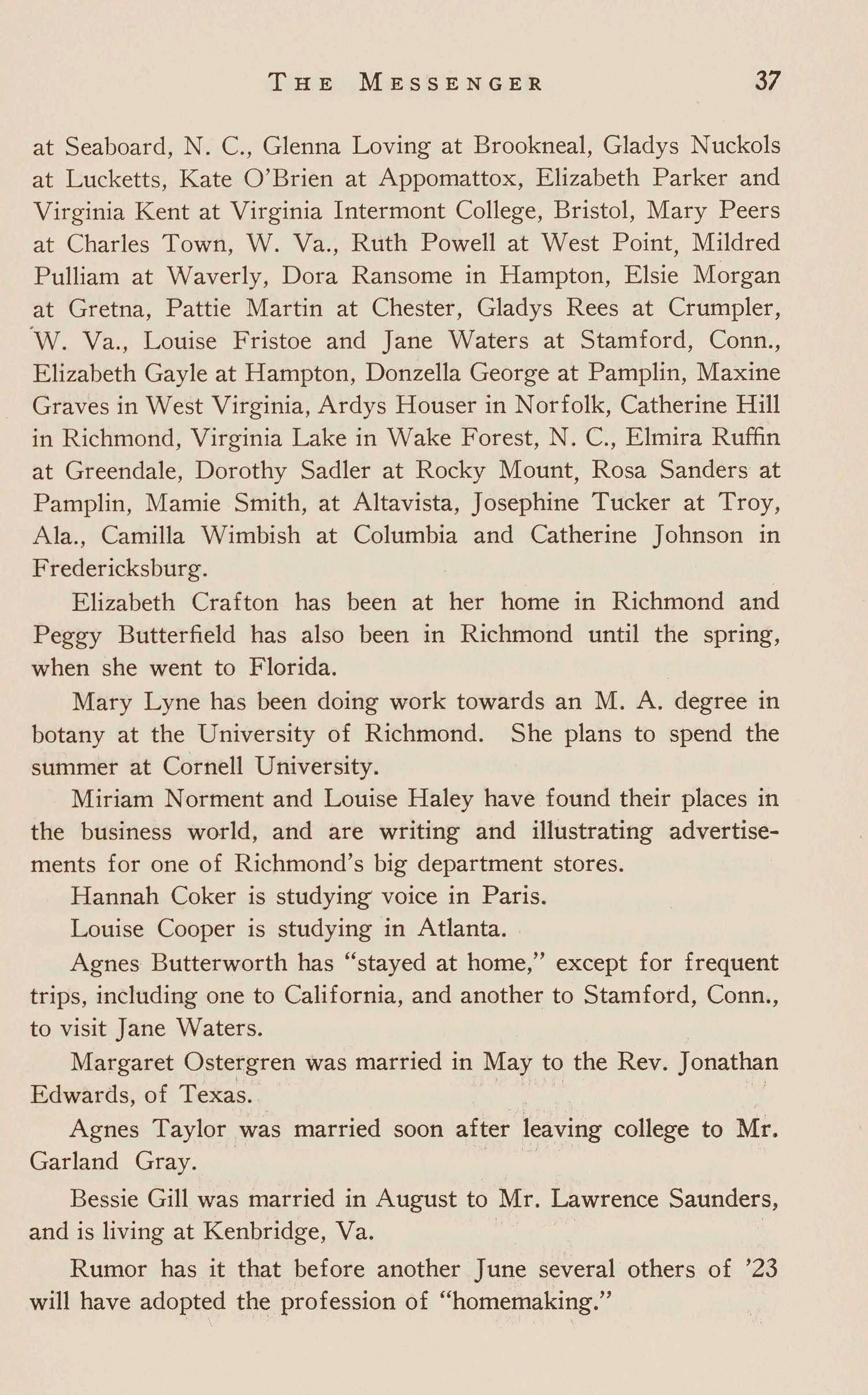
at Seaboard, N. C., Glenna Loving at Brookneal, Gladys Nuckols at Lucketts, Kate O'Brien at Appomattox, Elizabeth Parker and Virginia Kent at Virginia Intermont College, Bristol, Mary Peers at Charles Town, W. Va., Ruth Powell at West Point, Mildred Pulliam at Waverly, Dora Ransome in Hampton, Elsie Morgan at Gretna, Pattie Martin at Chester, Gladys Rees at Crumpler, ·w. Va., Louise Fristoe and Jane Waters at Stamford, Conn., Elizabeth Gayle at Hampton, Donzella George at Pamplin, Maxine Graves in West Virginia, Ardys Houser in Norfolk, Catherine Hill in Richmond, Virginia Lake in Wake Forest, N. C., Elmira Ruffin at Greendale, Dorothy Sadler at Rocky Mount, Rosa Sanders at Pamplin, Mamie Smith, at Altavista, Josephine Tucker at Troy, Ala., Camilla Wimbish at Columbia and Catherine Johnson in Fredericksburg.
Elizabeth Crafton has been at her home in Richmond and Peggy Butterfield has also been in Richmond until the spring, when she went to Florida.
Mary Lyne has been doing work towards an M. A. degree in botany at the University of Richmond. She plans to spend the summer at Cornell University.
Miriam Norment and Louise Haley have found their places in the business world, and are writing and illustrating advertisements for one of Richmond's big department stores.
Hannah Coker is studying voice in Paris.
Louise Cooper is studying in Atlanta.
Agnes Butterworth has "stayed at home," except for frequent trips, including one to California, and another to Stamford, Conn., to visit Jane Waters.
Margaret Ostergren was married in May to the Rev. Jonathan Edwards, of Texas.
Agnes Taylor was married soon after leaving college to Mi-. Garland Gray.
Bessie Gill was married in August to Mr. Lawrence Saunders, and is living at Kenbridge, Va.
Rumor has it that before another June several others of '23 will have adopted the profession of "homemaking."

Styles change. The Medi~val maiden counted with romantic ardor the knights who had died for her in combat gory; the Victorian girl, the number who let her reform them. The fin-de-siecle lass gaged popularity by the number of tastefully bound copies of "Lucile" left at her altar; in 1913, that co-ed was a wallflower who did not have at least two invitations a Sunday to go strolling out "where the new college campus is going to be."
Correctly parasoled and hair-ribboned, she accepted the most gratifying of these bids, and spent a happy afternoon wandering over "the new campus," trying to figure out on which side of the lake the Woman's College would sprout, and whether this ungainly foundation would turn into chapel or refectory. Then, when the mid-week theme was due, what better subject could rouse her Freshman pen? It just became natural for the last of the co-eds and first of the daughters of Westhampton to write about "The New Campus," so natural that a MESSENGERdevoted even in part to them would be incomplete without some mention of that much lauded topic.
There is a tradition abroad in the land that college campuses, like brooks, run on forever. While laughing, light-hearted students come and go they are supposed to remain, staid and stationery, firm anchorage for the memories of alumnae. They don't -at least not during the first ten years of existence. They more closely resemble frolicsome collie puppies, affectionate, adorable darlings, who suddenly, almost over night, abandon their infancy, and turn into graceful, mature specimens of artistic beauty.
The last of the co-eds and first of the Westhamptonites, reunion bound, leaves the car at Stop 30 and starts for her old familiar haunts, but she pauses, dazed. Lake bottom, they have been translated: First, of course, she misses the bus, the Black Maria, the hinky dinky, or whatsoever name you most prefer.
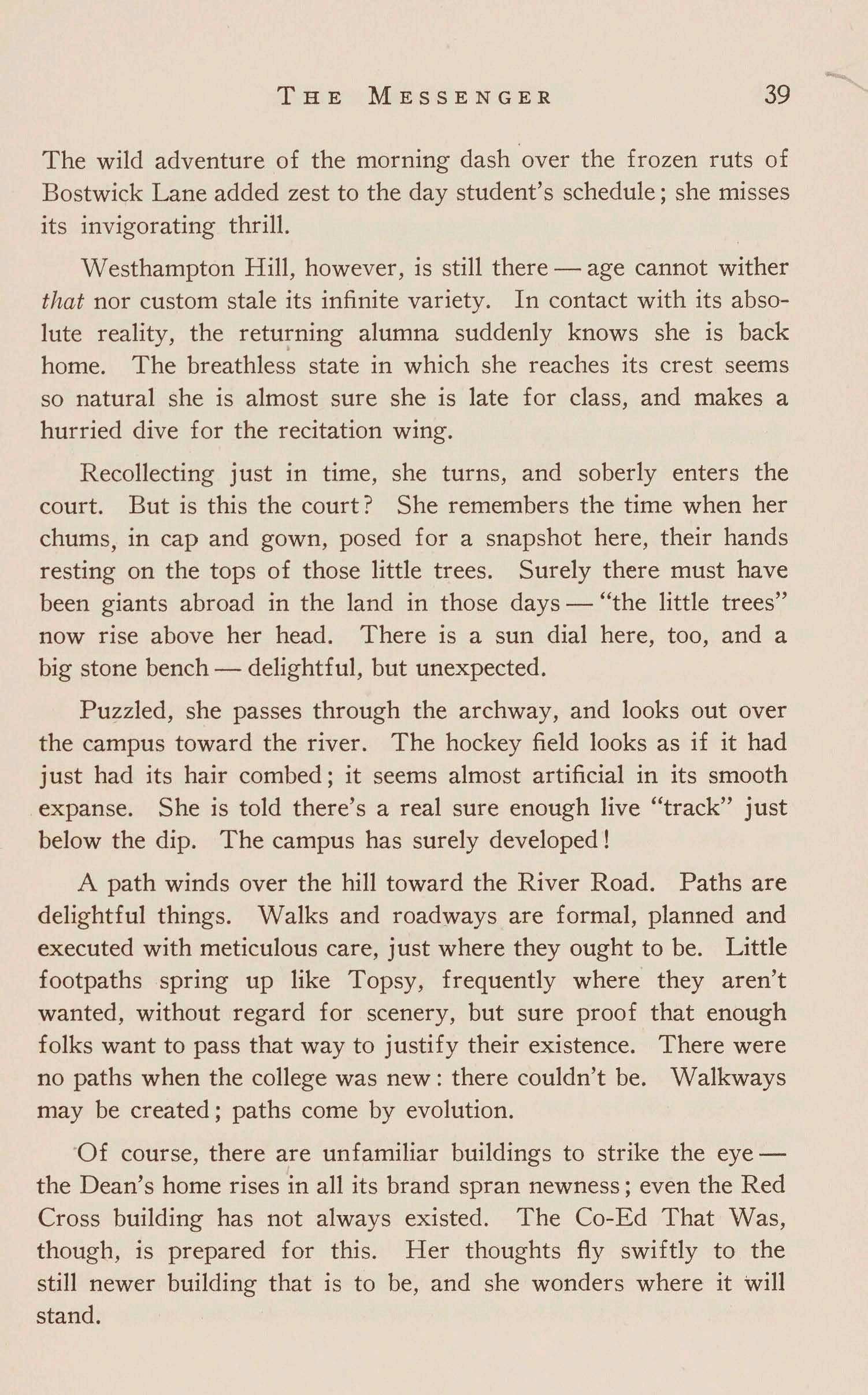
The wild adventure of the morning dash ·over the frozen ruts of Bostwick Lane added zest to the day student's schedule; she misses its invigorating thrill.
Westhampton Hill, however, is still there -age cannot wither that nor custom stale its infinite variety. In contact with its absolute reality, the retu~ning alumna suddenly knows she is back home. The breathless state in which she reaches its crest seems so natural she is almost sure she is late for class, and makes a hurried dive for the recitation wing.
Recollecting just in time, she turns, and soberly enters the court. But is this the court? She remembers the time when her chums, in cap and gown, posed for a snapshot here, their hands resting on the tops of those little trees. Surely there must have been giants abroad in the land in those days -"the little trees" now rise above her head. There is a sun dial here, too, and a big stone bench-delightful, but unexpected.
Puzzled, she passes through the archway, and looks out over the campus toward the river. The hockey field looks as if it had just had its hair combed; it seems almost artificial in its smooth expanse. She is told there's a real sure enough live "track" just below the dip. The campus has surely developed !
A path winds over the hill toward the River Road. Paths are delightful things. Walks and roadways are formal, planned and executed with meticulous care, just where they ought to be. Little footpaths spring up like Topsy, frequently where they aren't wanted, without regard for scenery, but sure proof that enough folks want to pass that way to justify their existence. There were no paths when the college was new: there couldn't be. Walkways may be created ; paths come by evolution.
Of course, there are unfamiliar buildings to strike the eyethe Dean's home rises in all its brand spran newness; even the Red Cross building has not always existed. The Co-Ed That Was, though, is prepared for this. Her thoughts fly swiftly to the still newer building that is to be, and she wonders where it will stand.
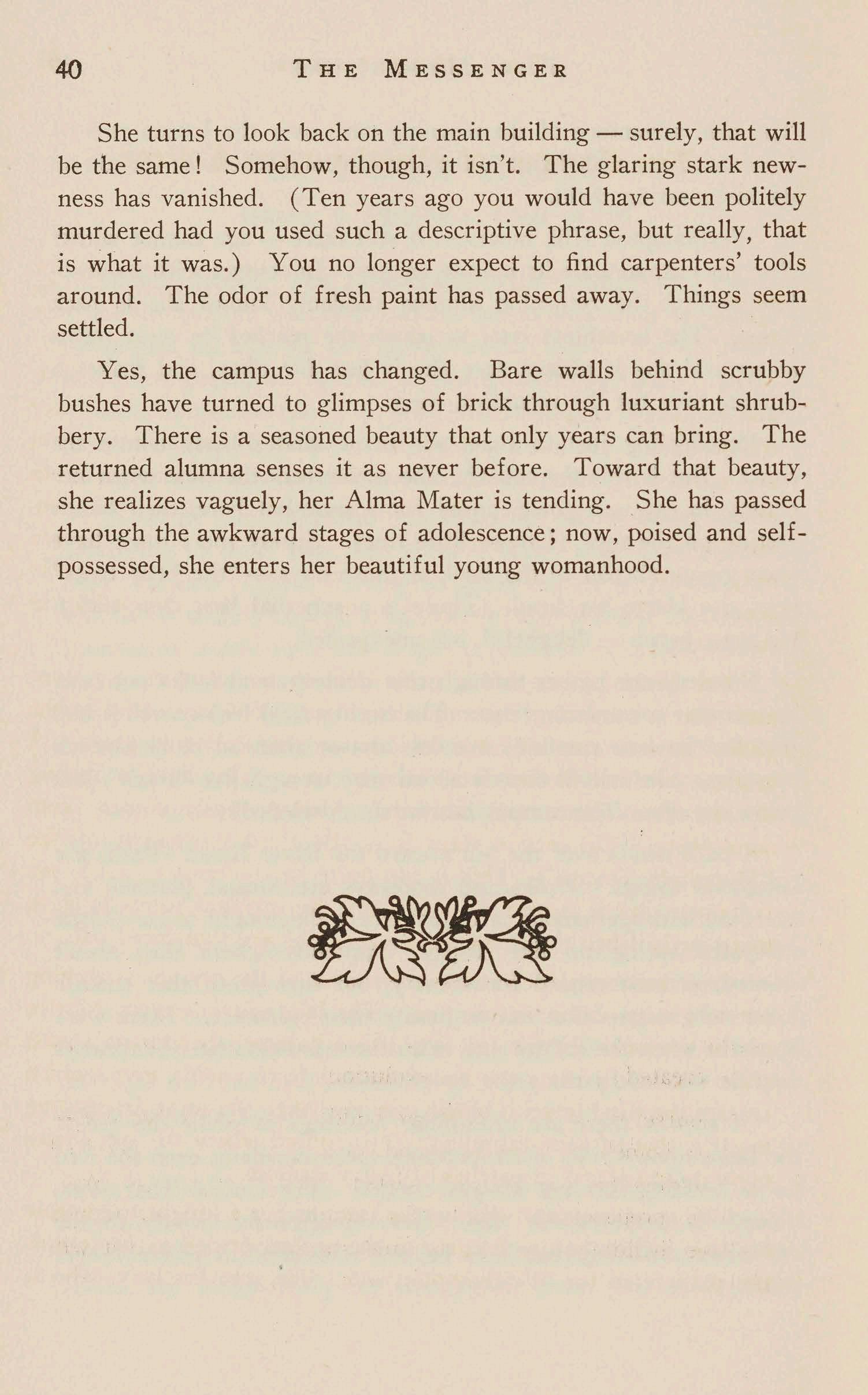
She turns to look back on the main building -surely, that will be the same! Somehow, though, it isn 't. The glaring stark newness has vanished. (Ten years ago you would have been politely murdered had you used such a descriptive phrase, but really, that is what it was.) You no longer expect to find carpenters' tools around. The odor of fresh paint has passed away. Things seem settled.
Yes, the campus has changed. Bare walls behind scrubby bushes have turned to glimpses of brick through luxuriant shrubbery. There is a seasoned beauty that only years can bring. The returned alumna senses it as never before. Toward that beauty, she realizes vaguely, her Alma Mater is tending. She has passed through the awkward stages of adolescence; now, poised and selfpossessed, she enters her beautiful young womanhood.

JEAN MACCARTY, '27
[The English Department of Westhampton College offered in the spring a prize of ten dollars for the best essay descriptive of the campus of the University. It chanced that all the competitors were from the Freshman Class of Westhampton College.]
A place of gently sloping hills, soft greens, shadows, sunlight, and exquisite buildings is the campus of Westhampton. To enter the grounds is not like a sudden plunge into cold water, where you are startled by unexpectedness, but like the entrance into a room where burns an open fire, the warmth of which creeps over you, enveloping you. The campus is not magnificent. The hills are only gentle slopes, and so you are not startled by spectacular scenery. The landscape is quiet in its beauty, but compelling in its charm.
The gentle slopes add a great deal to the campus, for over each one is something new and delightful. You can stand in the valley between two hills and look across the shadowed grass. A restless cardinal flashes from tree to tree. You have a feeling of marvelous peace and warmth. Always music comes from somewhere. On certain days it is the third movement of the "Moonlight Sonata." This is not quite so soothing as a Chopin Nocturne, but it is ever inspiring and the cardinal seems to flash more gayly when the tremendous arpeggios are thundered out.
Over another slope you have the pride of the campus stretching out to grassy shores before you. The lake mirrors every caprice of the seasons. In the fall it is like a painter's palette on a vast scale. When it rains the water turns a hard muddy grey, which freezes the wind when it blows over the lake. Its most fascinating mood is that of semi-calmness. It is ruffled where the sun shines upon it, and placid in patches of heavy shadow.
The most romantic spot on the campus for a knight to glimpse his love is just before he gets to the arched bridge as he rounds the path from the Westhampton side. He sees his lady, who is

setting on the rocks at the other side of the bridge, reflected in the water under the bridge. Her dress is a ravishing blue. He just has time to prepare all his charming bouquets before he joins her.
In the early morning the ground is covered with dust-colored webs of dew, which flash prismatic colors when the sun touches them. The air has a tang which is felt only m open, grasscovered expanses.
You have a feeling as of something clear, pure and striking when you look at the Gothic buildings. They are so precise, so well defined, and beautifully symmetrical. It is difficult to tell whether the clear outline of the roofs makes the sky more astoundingly blue or whether the blue sky makes the roofs stand out in contrast. Whatever it may be, it is certain that the sky never looks so blue as when you see it over the top of the tower.
Irish ivy already stretches out its long tendrils over the walls of the buildings in the court, promising some day to hang thick and dark over all the walls.
Brilliant red and yellow poppies and tulips bloom first in the oblong beds of the court. These later give place to deep purple flags, tawny lilies, and deep blue ragged robins. Far away over the hedge you can see masses of green leaves, which form a kind of pattern with their colors of pale and dark green.
The air of the court is always permeated with the smell of cedar. You get the delightful fragrance of the Christmas tree all the year 'round. A child entering the court at Christmas time would march up to the largest tree and demand it for her toys and Santa Claus.
Against all the buildings shrubbery grows in a protecting manner. It is mainly cedar, bridal wreath and bushes of white bellshaped flowers. Along the path to chapel great bushes of pinkish white roses fill the air with rather heavy perfume. This same kind of rose vine forms a thicket about the trunks of two of the trees . The fragile blossoms grow in clusters. A slate-grey catbird

darts in and out of this covert. He pretends to be only hopping aimlessly round the bush, but1 as soon as he gets half way round he hops in to stay. Among the thick grass also the glossy, cheerful looking butter cup has a good place in which to open wide its golden chalice.
When you walk 'round the winding road above the tennis courts you really feel that you're in a wild mountainous country. Blackberry bushes and wild pink roses bloom on one side of the road. At dusk it is easy to imagine yourself winding 'round the edge of one of the Smoky Mountains. A great loneliness pervades the place. Dark pines below look as if they are in a far-away valley. One particularly fine oak raises uneven branches above the rest of the trees. You expect to see a log, but leaning at an angle on some hillside in the distance. It is getting darker, and a decided chill makes you feel still more apart from the world. When it is wholly dark a pallid moon lights gloomy Dogwood Dell. Mist streams down like vast webs whose gigantic looms are the buildings of the court. The light from the windows is separated into golden threads among the webs. Across the hockey field the mist is like clouds below the mountain tops. It is grey and billowy. If you walk out across the field and then turn 'round, the buildings festooned in mist look like the "gleaming ramparts" of far-famed Carcassonne.

ELIZABETH w. ELLYSON, '19
Low curls the blue grey smoke
O'er the -shelled earth , While the moans of wounded folk Prayers to him give birth.
See! yonder slowly o'er the mound there moves God's answer to their prayers-the human cross, In glory by the afterglow embossedMan bearing man, thru barbed wire, His love proves, The two stand alone, one borne, Farming the cross
Against the sky - for lorn, Life counted dross.
Yet through. the dusk there gleams
A holy sign-
The Human Cross outlines
The Cross Divine.

RUTH CARVER GARDNER , '20
What does Westhampton mean to me? I shut my eyes, and see again the outline of her towers against the evening sky as, tired with work and play, groups of girls came tripping from laboratory and hockey field, library or street car. And for four years the quiet beauty of those buildings, the flashing lights from · the windows, meant to me - home !
What does Westhampton mean to me? I see again the panorama of the days; multiple interests, incessant activities: Latin and Math, broadening viewpoint. I see all this hum of life sweetened and made meaningful by the sister-spirit of Westhampton, which enveloped the newcomer immediately in its warm welcome . I see that little newcomer, bewitched and shy, taken into the hearts of the girls who came before, made to feel a part of the life of the college, blessed with friendships manifold and sweeter as the years prove and deepen them, dowered with a knowledge, subtle and growing , of the aims and ideals of what we call the Westhampton spirit. I see her, as she comes into a deeper understanding of this spirit, fired with the unexpressed and passionate desire that it should find expression through her, and through her be transmitted to the girls who come after. I see her and all the girls who formed that ever-changing student group, made one by their common devotion to her spirit, and their common love for that sunsetcrowned Alma Mater, whose life they so long to keep in its ideal beauty. I see them - those girls-going out to the ends of the earth, and, far or near, finding that the key-note of their lives and ideals is still in some way attune to that beautiful and young thought of sisterhood and service.
What does Westhampton mean to me? I lie back and chuckle as I remember our good times. Ah me ! Never were there such wonderful basketball and hockey teams as the teams of our college days! Never such a gallant spirit, never such loyal "rooters!"

Never were there such gay and extravagant pranks as we played, or such marvelous parties as we gave ! Ask any old girl if this is not so.
What does Westhampton mean to me? I see our teachers, those good friends, the very mention of whose names is often enough to bring together two girls of different college generations into a unity of understanding and experience. I see them as wise and patient counsellors, bearing with our youthful inexperience and cocksureness, helping us to correct our mistakes, likewise Mother Carey in the fairy tale, "making us make ourselves." May it rejoice their forbearing souls to know that the girls who knew so well how to manage things in college, have long ere this come to a realization of how much more than we our teachers knew !
What does Westhampton mean to me? The deepening of my spiritual life; the broadening of my ideals of service; the growing of my conception of God's way with humanity and men's and women's value to God; the opportunity to express and make practical my religious zeal in the organized religious work of the college. All these and much, much more, came to me in my college years, and for it I give reverent thanks when I think of what Westhampton means to me.
What does Westhampton mean to me ? Who can ever tell how much? The hundreds of girls who have gone out from her halls are working out in their own way what Westhampton means to us all.